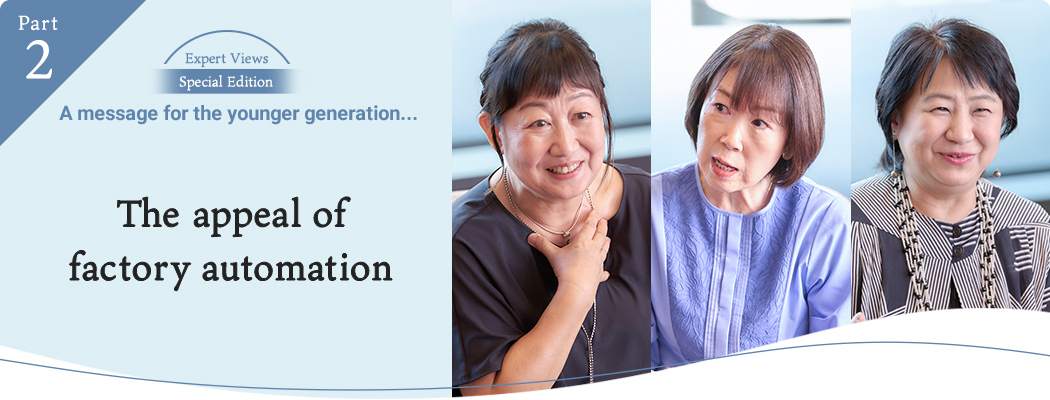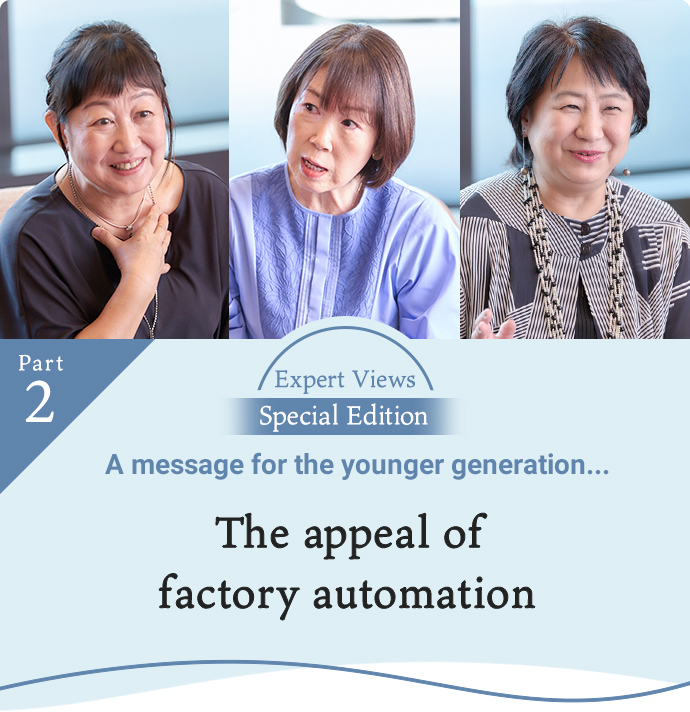
Expert Views

A message for the younger generation…
First Published in Japanese in November 2023 [4 parts]
Maki Mizowaki (center) was encouraged by her father to work for an electrical engineering company, but finally ended up taking over her family’s business. Tomoko Ohta (left) aspired to work in Germany, joined a company there and worked her way up to become president of the company’s Japanese subsidiary. Toshie Takeuchi of Mitsubishi Electric (right) seemed destined to follow a path in manufacturing. These three women came to the world of manufacturing in very different ways. What attracts them to factory automation?
- Nakamura:
- We have talked about how you got into the manufacturing industry, as well as the appeal of FA, which is used to automate production processes. Ms. Takeuchi, as Factory Automation Systems Group President at Mitsubishi Electric, what do you find particularly interesting about FA?
- Takeuchi:
- As President Mizowaki and President Ohta have mentioned, it’s the fact that virtually everything in our lives is made using factory automation equipment these days. If you trace the origin of the objects around you, it’s no exaggeration to say it almost all leads back to FA.
- Nakamura:
- Almost all man-made objects, including familiar household appliances, come from production lines operated by FA equipment, which ultimately forms the basis of all kinds of things – social infrastructure, systems, trains, cars, consumer goods and so on.
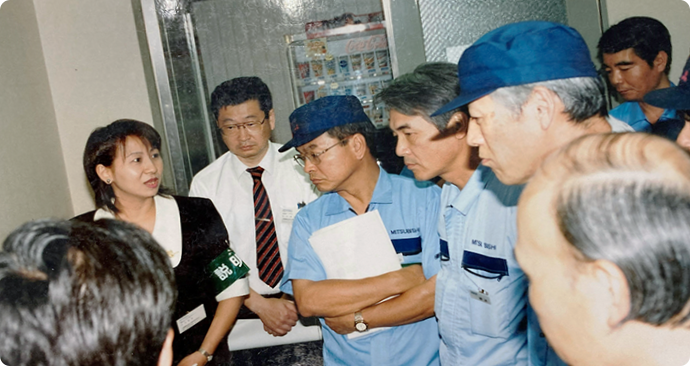
Takeuchi (left), the first female Unit Leader at the Advanced Technology R&D Center, explains her research results at a technology exhibition
- Takeuchi:
- That’s right. These days, most of the things we see are made using FA equipment. In a sense, FA connects the world. In addition to connecting manufacturing, FA also brought us here together today.
- Nakamura:
- According to the Global Gender Gap Report published by the World Economic Forum (WEF) in 2023, Japan’s gender gap index ranks 125th out of 146 countries, which is a disappointing result. Data from a 2019 report by Japan’s Ministry of Internal Affairs and Communications1shows that the percentage of female workers in the manufacturing industry is around 20%, and the percentage of women in managerial positions is less than 5%. Considering this situation, we want to support women working diligently in the manufacturing industry and the world of FA. That’s why we planned this round-table discussion.
President Ohta, what is your impression of the gender balance in the manufacturing industry in Germany?
- 1 Policy Evaluation to Promote Empowerment of Women – Interim report of survey results – March 8, 2019, Ministry of Internal Affairs and Communications Administrative Evaluation Bureau
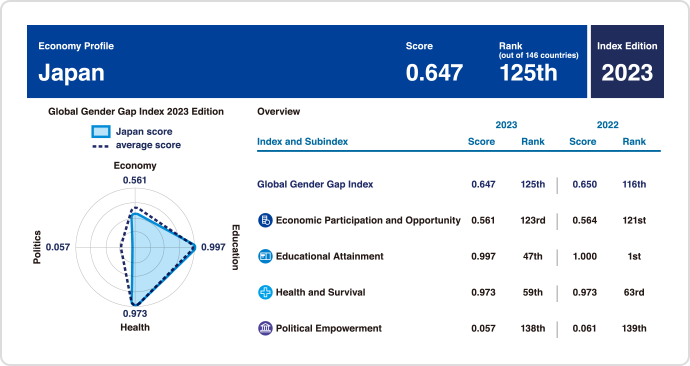
Japan’s Gender Gap Index for 2023 is ranked 125th in the world (source: Global Gender Gap Report 2023)
- Ohta:
- I remember that the first time I visited the company’s main factory in Germany, most of the employees were men. Since then, I feel that the number of women has gradually increased over time.
- Nakamura:
- Have you faced any difficulty as a woman in your career?
- Ohta:
- I didn’t really experience any difficulties specifically because I am a woman. One thing I do remember in terms of the gender gap is a speech at a training session for new employees, during which we were told “you are potential brides for our employees.” I was only 23 at the time and was totally shocked by the statement.
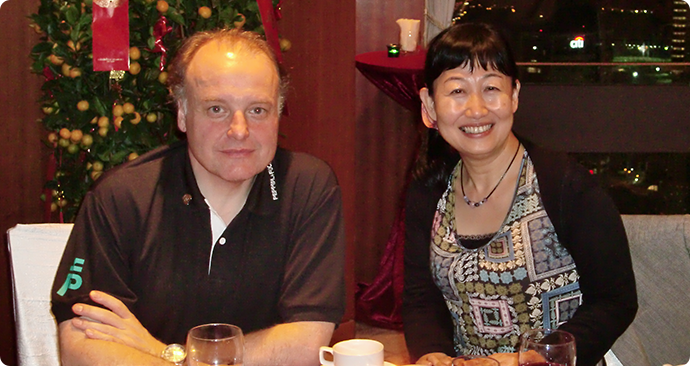
Dr. Gunther Kegel (left), CEO of Pepperl+Fuchs Group, with Tomoko Ohta at a dinner event during an FA Sales Conference in Singapore
- Nakamura:
- There used to be a saying in Japan that women were like Christmas cakes – they would be left on the shelf if they didn’t get married by 24. Ms. Takeuchi, do you have any memories relating to the gender gap?
- Takeuchi:
- Personally, I didn’t experience any difficulties because I am a woman either, but I do have a memorable experience that’s quite different to that of President Ohta. When I joined Mitsubishi Electric as a technical trainee, it was the year after Japan passed the Equal Employment Opportunity Law, so my training was the same as the one for male employees. This included physical training – we had to run several laps around the Itami factory first thing in the morning and swing a heavy hammer. I was the sporty type, so I managed to stick it out, but some female employees couldn't complete the training because it was too much for them physically. Ms. Nakamura, have you experienced a gender gap throughout your career?
- Nakamura:
- I was the first female career-track entry2 from a humanities background in the Factory Automation Systems Group. I will never forget what my boss said to me when I joined the company: “You are joining as a man, so do your best.” Positions were assigned based on gender – females were employed in clerical positions, and males in the career track – which meant that as a career-track entry, I was expected to deliver the same level of performance as men.
- 2 When Japanese companies hire employees, they often make a distinction between general positions, often involving clerical work, and career-track positions, where the employee is expected to take on more responsibility and progress through the company to a managerial role.
- Mizowaki:
- The training that Ms. Takeuchi experienced, and the attitude that Ms. Nakamura talks about give a sense of the times, don’t they. In my experience, I feel there was not as much discrimination in small and medium companies.
- Nakamura:
- I agree. Social trends and attitudes towards gender have changed since then. I think there are more opportunities for women in the manufacturing industry now. That’s why I want to tell our younger colleagues that the FA industry is more open to women to work in these days. The data presented shows that it is still undeniably a male-dominated world, but I feel that the gender gap has started to be addressed compared to when we started in our careers. As we work towards gender equality, we need to promote the sense of being evaluated as individual workers, regardless of our gender. Considering this, how we as women want to realize ourselves in the FA industry is important. I would like to continue our discussion focusing on some practical advice for that.

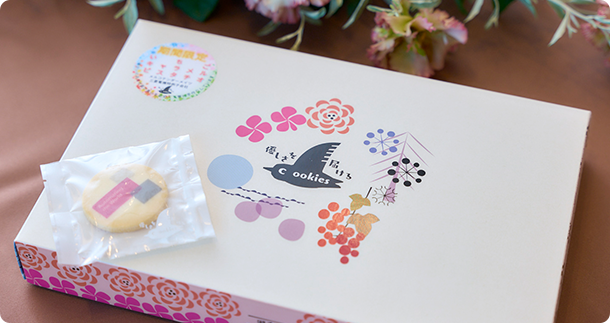
Our panelists were served tea accompanied by cookies made by Melco Tender Mates Corp., a company established by the Mitsubishi Electric Group as part of its social contribution initiatives to provide employment opportunities for people with disabilities. These lovingly made cookies have been printed with Mitsubishi Electric’s Factory Automation Systems Group’s global slogan “Automating the World“.
